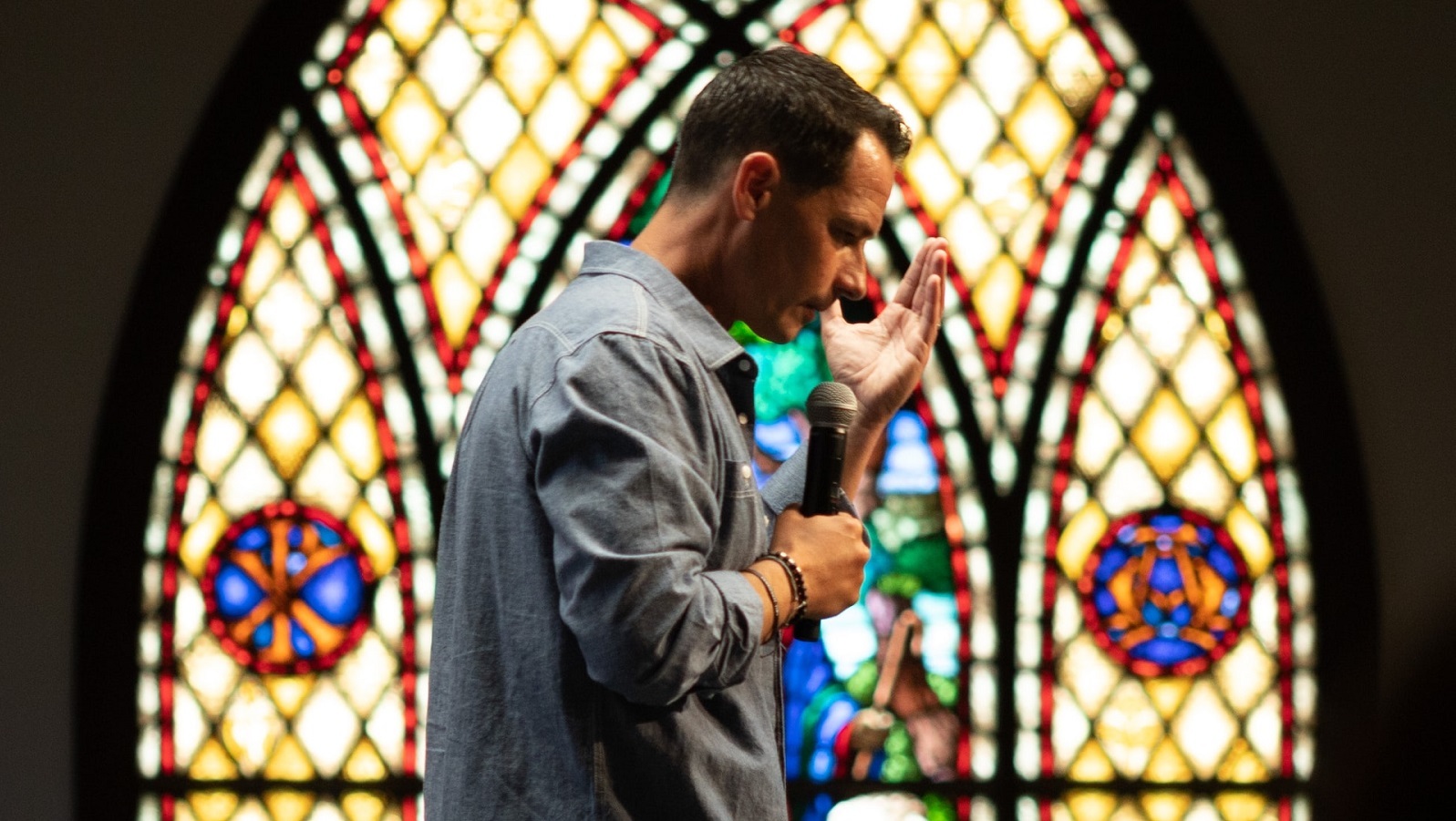There is perhaps no greater microcosm of the church in America than the struggles surrounding the local pastor. Ministry professionals are both the target and the source of unbiblical expectations and unhealthy church structures. In order to heal and improve the state of the Christian church in America, we must take a hard look at the American pastor.
A pastor of a modern American church is either a celebrity or a goat. Often both. We put so much pressure on church leaders, the head pastor chief among them. We expect pastors to be charismatic speakers, empathetic shepherds, shrewd CEOs, and around-the-clock counselors. We expect them to be moral beacons, to have all the answers, and to be happy all of the time.
The reality is, pastors are overwhelmed and burned out. According to Pastoral Care, Inc., three of every four pastors work more than 55 hours a week and more than 84% report feeling like they are on call 24/7. According to Soul Shepherding, another ministry committed to helping pastors, 77% report having a bad marriage and 80% will not be in ministry in ten years.
The church’s solution to this, in recent history, has been the sabbatical. This is a practice where the pastor “takes off” for three to six months every ten years or so. How telling is it that we have admitted to a structure where the role of a pastor is not sustainable. If we cannot sustain healthy pastors on a consistent basis, the sabbatical is a temporary stopgap. An inefficient one, at that. If we have a structure where pastors cannot thrive, we need a solution that involves changing the structure, not just dismissing the pastor when the inevitable burnout grows to overwhelming proportions.
Pastor burnout is only half the problem. The other side of the coin is that pastors start to become agents of the worst of the church structure, contributing to the very system that is stifling them. Pastors often complain about being overworked while at the same time working to sustain a culture dependent on them, their talents, and their opinions.
This is the great Catch-22 of pastoring. We have created a church structure that chews up leaders and spits them out. The ones that survive are usually the most brash, charismatic, and often abusive kinds of personalities (listen to the podcast “The Rise and Fall of Mars Hill” for just one example of how this plays out). Even if they maintain a deep passion for ministry and love for the Lord, something in them conforms into the very system that burns them up.
Pastors want to empower others. They want to see their congregants become activated disciples throughout the entirety of the week. They want the gospel to grow outward. Yet, their very livelihood depends on this not being the case. A pastor needs congregants who depend on him/her, a highly attended Sunday morning experience, and a revered status in order to keep their job.
This is the rock and hard place pastors are so often caught between. They do not need activated disciples to keep their jobs; they need exciting and thrilling Sunday mornings. They do not need the people of God to step into ownership to progress in their ministry career; they need to develop a personality, a brand. Pastors too often feed on followers rather than commit to converts. Unfortunately, the nature of Christian ministry is such that it is often difficult to discern the difference.
Much of the modern criticism around pastors suggests we have pastors who do not love Jesus enough and are thus morally corrupt. We think we need people of better character stepping into these roles. But the truth is we have developed a church structure that takes men and women of good character and ushers them toward dysfunction. It is not that bad people are becoming pastors; it is that our current structure funnels pastors toward temptation rather than spiritual maturity.
We do need church leaders of moral character. But moral character does not pay the bills. Charisma and high attendance does. If they want to succeed, if they want to stay, the path of least resistance guides them toward the latter, often at the expense of the former. And if they do not follow, they are fired. Thus, if we get to a place where the only surviving pastors are those of poor character and thrilling charisma, we have only ourselves to blame.
Here is interesting food for thought: should pastors get paid at all? Should the role of a pastor be a profession? After all, Paul was a tentmaker. Jesus Himself says, “No one can serve two masters; for either he will hate the one and love the other, or he will be devoted to one and despise the other. You cannot serve God and wealth.” ( Matthew 6:24, NIV). Are we putting pastors in an impossible situation when we are asking them to minister and make money at the same time?
It is not only specially trained leaders who are capable of shepherding. Even so, we can train leaders without asking them to commit their career and finances. It is not solely seminary grads that can preach. The Body of Christ is meant to be a menagerie of everyday people stepping into these roles. What we have done instead is outsource to a single person (or a small team), expecting all the spiritual guidance to come from external sources. All that is left is for us to consume and complain. The real responsibility is on the professionals.
Pastors themselves need to take a good, hard look in the mirror and discern how much of what they are doing is for the elevation of their career versus the activation of their congregation.
It is absolutely amazing that when Mark Driscoll, the subject of the podcast recommended above, left Mars Hill, the entire church network collapsed. This kind of centralized leadership is dangerous. Even in the best of circumstances, it creates a divide between spiritual professionals and spiritual consumers, neither truly operating at their best.
Perhaps it is time our trained ministry professionals were not dependent on an income. What if the person who preached on Sunday was a schoolteacher the rest of the week? Would the kingdom of God suffer or grow? What does a pastor do that requires forty hours of paid work a week (let alone 50-70)? The answer, I fear, is the kind of things their congregants ought to be doing for one another.
Even the moniker ‘head pastor’ is problematic. For most churches in America, the personality of the pastor is their defining trait. That is a disastrous reality. Jesus ought to be the head of the church. And no matter how much we claim it is, the practical reality is that our churches are designed around the wisdom and speaking prowess of one person. The culture of the American church is too dependent on pastors. The ministry leader feels it in the form of burnout. And the congregation feels it in the form of apathy.
Until we address this reality, both pastors and congregants will continue to struggle and miss out on some of what God has for his church.









